

10 Etiquette Rules For Meetings That Every Professional Needs To Know. Mike Nudelman / Business Insider Even if you dread them, meetings put you in front of coworkers and bosses who you may not work with on a regular basis.
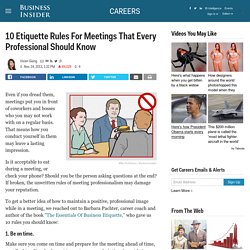
That means how you conduct yourself in them may leave a lasting impression. Is it acceptable to eat during a meeting, or check your phone? Should you be the person asking questions at the end? If broken, the unwritten rules of meeting professionalism may damage your reputation. Business Meeting Etiquette: 8 Pet Peeves. 11_Commandments_for_Bus_Meet_Etiquette.pdf. Emily Post Business Etiquette Training Meeting Tips. Use business meetings to display your etiquette skills and as an opportunity to further succeed.
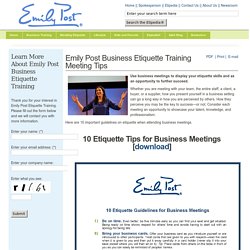
Whether you are meeting with your team, the entire staff, a client, a buyer, or a supplier, how you present yourself in a business setting can go a long way in how you are perceived by others. How they perceive you may be the key to success—or not. Consider each meeting an opportunity to showcase your talent, knowledge, and professionalism. Here are 10 important guidelines on etiquette when attending business meetings. 10 Etiquette Tips for Business Meetings [download] Click the link to download - 10 Etiquette Guidelines for Business Meetings At Emily Post, we don’t teach rules or preach protocol. To learn more about our seminars, please contact Steven Puettner or by email at steven@emilypost.comThis e-mail address is being protected from spambots. "This seminar was wonderful! Contact Us. Meeting Etiquette. Leave the meeting etiquette page and return to the effective meeting home page Running Effective Meetings - Ground Rules.
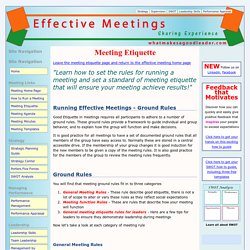
Business Meeting Etiquette. Top 10 Must Do’s For Effective Meetings. Four Simple Rules for an Effective Meeting Rules (kvaes.be) Productive Meetings. Digital Tools to Make Your Next Meeting More Productive. This spring, I wrote about how the right digital tools can help you work more efficiently before, during, and after a meeting.
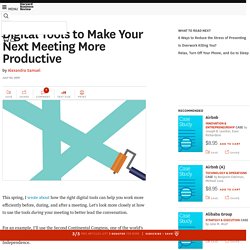
Let’s look more closely at how to use the tools during your meeting to better lead the conversation. For an example, I’ll use the Second Continental Congress, one of the world’s most productive off-sites, which resulted in the U.S. Declaration of Independence. Do You Really Need to Hold That Meeting? Break Your Addiction to Meetings. Manager, noun.

Textbook Definition: An individual who is in charge of a certain group of tasks, or a certain subset of a company. A manager often has a staff of people who report to him or her. Modern Translation: An individual who races through the halls in a frantic attempt to make the next meeting on time while also answering e-mails on his or her mobile device. A few of you may adhere to the textbook definition of “manager,” and if so, kudos to you. The Seven Imperatives to Keeping Meetings on Track.
There’s nothing more annoying than a meeting that goes on and on and on.

As a manager, it’s your job to make sure people don’t go off on tangents or give endless speeches. But how can you keep people focused without being a taskmaster or squashing creativity? What the Experts Say The good news is that meeting management isn’t rocket science; you probably already know what you should be doing. The bad news is that keeping your meeting on track takes discipline, and few people make the effort to get it right. “The fact is people haven’t thought about how to run a good meeting, or they’ve never been trained, or they’re simply too busy,” says Bob Pozen, a senior lecturer at Harvard Business School, senior fellow at Brookings Institute, and author of Extreme Productivity.
Make the purpose clear You can head off a lot of problems by stating the reason for getting together right up front. Control the size Meetings can get out of control if there are too many people in the room. Do: 10 Tips to Improve Your Meetings. By Pat Sanaghan (The Sanaghan Group) Most meetings simply don't work and are a waste of precious time.
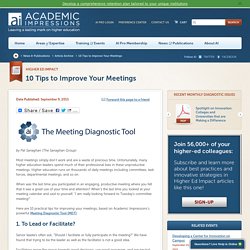
Unfortunately, many higher education leaders spend much of their professional lives in these unproductive meetings. Higher education runs on thousands of daily meetings including committees, task forces, departmental meetings, and so on. When was the last time you participated in an engaging, productive meeting where you felt that it was a great use of your time and attention? Empathy Is Key to a Great Meeting. Yes, we all hate meetings.

Yes, they are usually a waste of time. And yes, they’re here to stay. So it’s your responsibility as a leader to make them better. This doesn’t mean just make them shorter, more efficient, more organized. People need to enjoy them and, dare I say it, have fun. Happiness matters a lot at work — how could it not, when many of us spend most of our waking hours there. So how do we fix meetings so they are more enjoyable and produce more positive feelings? Why empathy? Carefully reading people will also help you understand the major, and often hidden conflicts in the group.
Empathy lets you “see” and manage these power dynamics. Keep in mind that employing empathy will help you understand how people are responding to you. This is where emotional self-management comes in, for a couple of reasons. Second, strong emotions set the tone for the entire group. The other side of the coin is obvious.